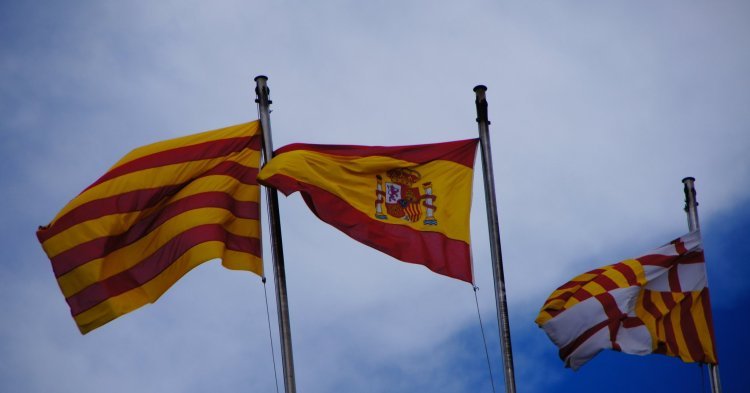Juuso Järviniemi: Staying in Europe?
It’s difficult for a foreigner to comment on questions of national identity and independence in specific cases. For a Finn following political discussions in Scotland, this is lived experience, and from this point of view, the case of Catalonia is no different. In what is largely a question of how one feels – rather Catalan or Spanish – one can ask to what extent an outsider is entitled to an opinion. However, here’s a European’s tuppenceworth.
A pro-European’s main concern about Scotland is whether its pro-EU population gets to stay in Europe. In light of the Madrid government’s response to Sunday’s independence referendum, the question of “staying in Europe” takes an even more complicated twist in Catalonia’s case. As with Scotland, there is the question of whether an independent Catalonia would be accepted as an EU member state. For numerous reasons, today’s chaotic referendum made the question no more imminent, but in the longer term, the question will inevitably be of great significance for all those engaging with the question of Catalan independence.
In reflecting today’s events, we are not asking whether Barcelona is staying in Europe, but whether Madrid is. Whether or not one considers a referendum illegal or politically disadvantageous, violence and coercion are not how a European government is to react. Political leaders in Spain and elsewhere have called for negotiation and de-escalation. On the Europp blog, Domenico Giannino argues that legal wrangling is futile in what is in fact a political conflict that requires a political solution.
The original purpose of the European project was to replace violence with negotiation. The confrontational rhetoric we have witnessed so far doesn’t constitute a dialogue that could lead to mutually acceptable solutions. It’s time to bring the riot police back home, drop plans for unilateral secession, and sit down to talk. What is required is a negotiation where no-one expects to have all their demands satisfied. The European project is about compromise, not coercion or doing something just because you can.
Juuso Järviniemi is an Editor-in-Chief of The New Federalist.
Laura Mercier : Catalonia – Should the EU intervene ?
The question of Catalan independence is an internal matter of the Spanish state. Nevertheless, we cannot ignore the escalation of tensions and police violence towards peaceful protesters that have occurred in the past few days.
We shouldn’t condemn or justify either one of the parties involved. The situation has been in a deadlock for several years, and the escalation of tension was everything but unpredictable, since nothing had been done in the way of dialogue. The Spanish central government and Catalan authorities haven’t succeeded in agreeing on a way out of the crisis, which has led to unacceptable police violence against Catalan citizens who wanted to vote. Whether this referendum is considered illegal from the viewpoint of the Spanish Constitution, or if it is rather legitimated by international law, the Spanish and Catalan governments should have resumed dialogue to avoid this chaos.
Should the European Union have acted or intervened? The silence of European leaders on this question is heavy and embarrassing. The stalemate that has formed in Spain cannot be denied. In the immediate term, whether European leaders are in favour or against independence doesn’t matter. On the contrary, in the absence of dialogue between the two parties, the EU could have played the role of a mediator with a view to pacifying the situation. Perhaps it’s in the capacity to mediate without interfering in questions of national sovereignty that the EU is lacking. And this is probably one of the reasons why European leaders don’t want to venture, even if that risks complicating the situation.
The Catalan impasse reveals the Union’s lack of ability to mediate within itself, and its ambiguous relationship towards the member states and their sovereignty. One question thus arises: which institution would be more appropriate for intervening and mediating a resolution to the conflict that meets the expectations of the national level and the requirements of European and international law?
Laura Mercier is an Editor-in-Chief of Le Taurillon, the French version of the JEF webzine.
Gesine Weber: Promote dialogue instead of undermining it with violence
Catalonia could have made a European example of independence of a region with its referendum which was planned to be held yesterday. While the founding fathers of Europe as well as many pro-Europeans were convinced that the times of particularism were over in Europe, the Catalan referendum showed that this is obviously not the case. Membership of the European Union and a sense of belonging which might emerge from this membership cannot hide the fact of strong regional identity nor suppress it.
In fact, it is the Spanish government which made an example yesterday by trying to prevent the referendum on the Catalan independence with all means at its disposal. The government in Madrid even deemed the use of force a legitimate way to prevent people from voting for their independence. With this decision, the Spanish government as the official government of a democratic state shot itself in the foot, with consequences which are imponderable today.
Nevertheless, the Catalan referendum should also have prompted the Spanish government to prudent politics with regard to European issues, but considering the violence in front of the polling stations, this obviously failed. There is no doubt that a successful referendum on Catalan independence would have implicated the Rajoy government suffering a severe domestic defeat, and could furthermore have incited other European separatist movements to imitation. However, Europe as a project of peace would in no way be affected by a Catalan independence. In contrast, a well-organised referendum would have had the potential to foster the discourse on regional identity and a federal Europe of regions. This dialogue should not only be an essential element of Spanish domestic politics with regard to Catalonia; Spain should also share its experiences and push ahead with a comparable dialogue on a European level. Nevertheless, this requires openness to dialogue - from both sides involved.
Gesine Weber is an Editor-in-Chief of Treffpunkt Europa, the German version of the JEF webzine.
European perspective articles featuring comments from editors of the JEF web magazine represent the views of the editors, not JEF. For the views of JEF-Europe, please refer to the JEF Political Platform, resolutions passed at the statutory meetings of JEF, and the official statements of JEF-Europe.




Follow the comments: |
|
